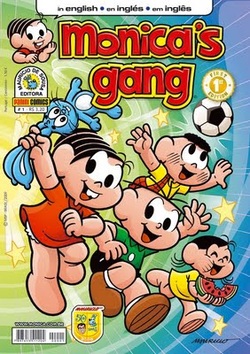 When I started studying Portuguese with Rebeca Coelho in the Fall of 2013, I didn’t expect to encounter comics. Rebeca used a variety of authentic sources to illustrate real language use and A turma da Mônica (Monica’s Gang), by Mauricio de Sousa, Brazil’s most successful comic, caught my attention. Aside from being cute and colorful, it taught me novel uses of the language like puns and in some ways contrasted with my expectations for children’s comics. For example, Monica hit her friends; her friends, Cascão and Cebolinha, who were less than 10-years-old, had overt amorous feelings towards their babysitter; and when a joke’s humor required a boy character to be nude, illustrators did not shy away from including the characters’ genitals. So when the class was instructed to do a cultural project for the semester, something that would focus on something specific to the Lusophone world, I decided to that this series would make for an engaging topic. And it did. I found, however, that I couldn’t speak about Mônica without talking about Charles Schulz and his series, Peanuts. Peanuts was my point of reference for any comic that began in the newspaper and, as my research showed, a worldwide classic beyond U.S. borders. What I noticed was that both of these series had a similar feel. They involved grade-school characters who spent time together playing and discovering the ironies of life. Little attention was paid to adults and their surroundings were generally safe. I noticed, however, that some other comics, published in different periods, while still featuring children, were decidedly more abrasive and political. Aaron McGruder’s The Boondocks was one of them and Alexandre Beck’s Armandinho was another. These two series were admitting themes that resonated far from the playground, among them social injustice, race relations, environmentalism and others. It was around this time that I felt a pressure to formalize my study of these issues. After all, the materials I’d need kept accumulating and who better to direct me than Dr. Carol Tilley, a professor of comics at the University of Illinois at Urbana-Champaign. “Out of the Mouths of Babes” is the preliminary result of my investigation and I share it with you here. The title is of biblical inspiration from Psalm 8:2 and has made its way into popular U.S. vernacular. The phrase is used to express astonishment at wisdom seen in children, the phenomenon I, too, saw in the comics that form the basis of this study. I recommend that you start reading around page 3. And I will say two additional things in conclusion. It was the conversations surrounding these questions and queries that led me to write a strong research proposal for the Foreign Language and Area Studies (FLAS) fellowship and I expect it to be strong fodder as well for a Fulbright. Special thanks to Christine Jenkins, Kathryn LaBarre Amani Ayad and Sharon Irish for their constant votes of support.
0 Comments
Leave a Reply. |
AuthorMy name is Katrina Spencer. I'm a librarian. Archives
February 2020
Categories |
||||||||||||
 RSS Feed
RSS Feed